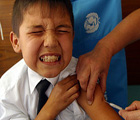 AtriCure (NASDAQ:ATRC) founder, Michael Hooven‘s next project could change the way children are injected with vaccines. Hooven politely declined to provide much detail on Cincinnati-based Enable Injections, saying that the company is still in its very early stages — though that could be changing soon.
AtriCure (NASDAQ:ATRC) founder, Michael Hooven‘s next project could change the way children are injected with vaccines. Hooven politely declined to provide much detail on Cincinnati-based Enable Injections, saying that the company is still in its very early stages — though that could be changing soon.
“In general, there are some very exciting developments we expect to see in the next few months with Enable Injections,” he said, choosing not to give any hints on what those exciting developments might be.
Hooven did allow that the company’s technology was developed at Cincinnati Children’s Hospital Medical Center, and that Enable has received funding from the hospital and state-backed venture development group CincyTech.
While not a lot of specifics about Enable are known, Hooven has publicly discussed the broad outlines of his plans for the company. Last year, he told Hi Velocity Media that Enable is developing a painless injection for children’s vaccines and aims to pioneer a safer, faster and lower-cost drug-injection technology.
“The days of the big, scary needles are coming to an end,” he said.
A longtime medical device veteran with a background in physics and mechanical engineering, Hooven started working with Cordis and Cincinnati’s Ethicon Endo-Surgery (both since acquired by Johnson & Johnson) in the 1980s. He went on to found cardiac surgical device maker AtriCure, which went public in 2005 and is working to develop a “hybrid” approach to treating atrial fibrillation that it says holds a market potential of $2 billion.
In the world of startups, success often breeds success, so Hooven’s accomplishments with AtriCure will clearly serve him well as he tries to grow Enable.
“He’s now got the kind of reputation where he can to go the big West Coast VCs and they know who he is and they’ll back him,” said Rick D’Augustine, an executive in residence with CincyTech who’s known Hooven for about 20 years since they worked together at Ethicon Endo-Surgery. “We don’t have too many guys like that in Cincinnati.”
D’Augustine was also reluctant to provide much detail of the technology Enable is developing. “It’s just taking a different approach to how you deliver any kind of therapeutic with an injection,” he said.
CincyTech has been working with Hooven to identify markets for the technology beyond children’s vaccinations, plus opportunities for nondilutive grant funding. D’Augustine has an insight into Enable’s technology that few others do — he allowed Hooven to use a prototype of the device on him. “I had this thing in my arm and it felt like someone had pinched me,” he said.
That experience, plus his history with Hooven, have D’Augustine feeling confident that Enable’s future is bright.
“What Mike is great at — he’s one of the best I’ve ever worked with – is coming up with a simple, elegant and cost-effective solution to a unique problem,” D’Augustine said.
Innova Medical Design, another development stage company, has designed an effective and pragmatic solution to alleviate needle pain associated with blood draws, IV starts, injections, vaccinations and lancet piercing. Prototypes have been produced and successfully tested in 2009. New product development is underway to address needle and lancet pain for diabetic patients. Innova is located in Minneapolis, MN.